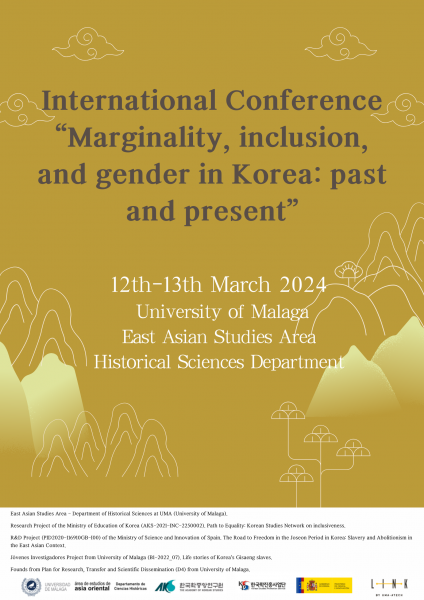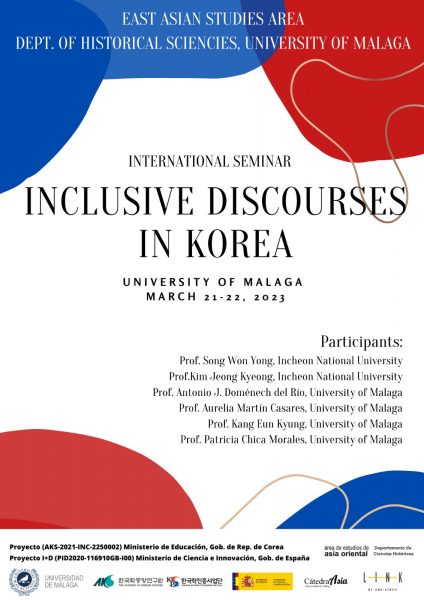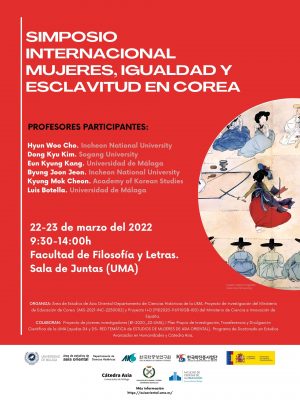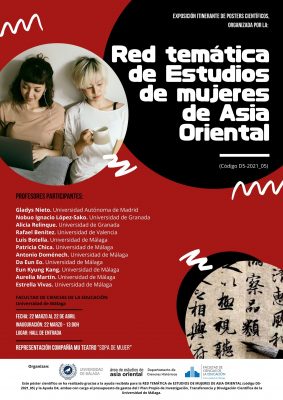INTERNATIONAL CONFERENCE “MARGINALITY, INCLUSION, AND GENDER IN KOREA: PAST AND PRESENT”
The Area of East Asian Studies organized the International Conference “Marginality, inclusion, and gender in Korea: past and present” in March 2024 at the Rayo Verde building of the University of Malaga.
Through numerous presentations, the relationships between different processes of discrimination and integration of social groups within Korean society were analyzed from a wide variety of topics. The presentations were conducted by experts in these fields, from the University of Malaga, as well as other universities from different countries, such as South Korea, Japan, China, the Czech Republic, Poland, Germany, Romania, India, Mexico, and the United States. Additionally, we also enjoyed a performance by the Mu Theater company, directed by Professor Eun Kyung Kang and in collaboration with the School of Dramatic Art of the UMA.
This conference was organized within the framework of the research project Academy of Korean Studies Seed Program for Korean Studies (Advanced Track) “Path to Equality: Korean Studies Network on inclusiveness” (AKS-2021-INC-2250002), the R&D&I Project ASIA-SLAVES “The path to freedom in the Joseon period in Korea: Slavery and abolitionism in the context of East Asia” (PID2020-116910GB-I00), the Young Researchers Project “Life stories of gisaeng slaves in Korea” (B1-2022_07) of the UMA’s Own Plan for Research, Transfer and Scientific Dissemination (PPITD), and Grant D4 from the PPITD.

International Seminar “Inclusive Discourses in Korea”
The Area of East Asian Studies-Department of Historical Sciences of the UMA organized the International Seminar “Inclusive Discourses in Korea” on March 21 and 22, 2023, held in Room 201 of the Green Ray Building at the UMA extension.
This Seminar featured six conferences on equality and inclusion discourses in Korea conducted by experts in these fields, from South Korea’s Incheon National University, as well as from the University of Malaga itself.
Additionally, as part of the event, on March 21, the Workshop PhD Korean Studies student “Inclusive Discourses in Korea” took place, where doctoral students from the Area of East Asian Studies presented their current research, proposing a dialogue between these doctoral students and the professors who are experts in the subject. This took place in classroom 1.07 of the Faculty of Social and Labor Studies.
The Seminar has been organized within the framework of the projects “Path to equality: Korean Studies Network on inclusiveness” from the Ministry of Education of Korea (AKS-2021-INC-2250002) and “ASIA-SLAVES The path to freedom in the Joseon period in Korea: Slavery and abolitionism in the context of East Asia” from the Ministry of Science and Innovation of Spain (PID2020-116910GB-I00).

INTERNATIONAL SYMPOSIUM WOMEN, EQUALITY, AND SLAVERY IN KOREA
The Area of East Asian Studies-Department of Historical Sciences of the UMA organized the International Symposium “Women, equality, and slavery in Korea” on March 22 and 23, 2022, held in the “Manuel Rodríguez de Berlanga” Meeting Room of the Faculty of Philosophy and Letters and in the hall of the Faculty of Education Sciences.
This Symposium featured six conferences on gender and slavery in Korea conducted by experts in these fields, from South Korea’s Incheon National University, Sogang University, and the Academy of Korean Studies, as well as from the University of Malaga itself.
Additionally, as part of the event, on March 22, the inauguration of the scientific poster exhibition of the “Thematic Network of Women from East Asia: Korea, China, and Japan” took place in the Hall of the Faculty of Education Sciences, with the participation of expert professors in the subject from different public universities in Spain. The inauguration was accompanied by the performance “Soup of women” by the Mu Theater company at 1:00 p.m. The Symposium concluded on March 23 at 1:30 p.m. with a performance of “Games” by students of the Degree in East Asian Studies under the direction of Prof. Eun Kyung Kang outside the Faculty of Philosophy and Letters.
This activity has been organized within the framework of the “Path to equality: Korean Studies Network on inclusiveness” from the Ministry of Education of Korea (AKS-2021-INC-2250002) and “ASIA-SLAVES The path to freedom in the Joseon period in Korea: Slavery and abolitionism in the context of East Asia” from the Ministry of Science and Innovation of Spain (PID2020-116910GB-I00) and has received funding from the First Own Plan for Research, Transfer, and Dissemination.


INAUGURAL CONFERENCE OF Degree on East Asian Studies (GEAOR) 21/22 AT THE UNIVERSITY OF SEVILLE, LED BY PROF. ANTONIO J. DOMÉNECH (UMA)
On October 14th, Professor Antonio Doménech, coordinator of GEAOR at the University of Malaga, delivered the inaugural conference of GEAOR at the Universityo of Seville. In the lecture titled “The Secret to Eradicating Ignorance: Yi Yulgok and his Philosophy of Education,” he presented the teachings of this important Confucian philosopher.
QUALITATIVE RESEARCH WITH A GENDER PERSPECTIVE IN THE CONTEXT OF KOREAN STUDIES RESEARCH: BUILDING CREATIVE SPACES OF UNDERSTANDING (SEPT 28 - OCT 19)
On September 28th, the training workshop “Qualitative Research with a Gender Perspective in the Context of Korean Studies Research: Building Creative Spaces of Understanding” started.
The workshop is part of the equality initiative “The Korean Wave: Permanent Seminar on Gender Research” of the Vice-Rectorate for Equality, Diversity, and Social Action of the University of Malaga.
The workshop aims to train final year students of the Degree in Asian Studies on how to approach qualitative research with a gender perspective in the mentioned area. For this purpose, the course is divided into two distinct parts.
Firstly, an introduction to qualitative research with a gender perspective was provided, followed by a focus on South Korea. For this, the presence of two leading experts in the field, Prof. Aurelia Martín Casares and Prof. Antonio J. Doménech del Río, is enlisted. The theoretical training is complemented by an approach to the demands of South Korean women that involve or include creativity and the arts in their reflection. For this second part, Prof. Eun Kyung Kang and Prof. Patricia Chica are available.
The last part of the workshop was predominantly practical. There, a group performative exercise was conducted, in which the entire class had to participate in the creation of a performance directed by Professor Kang. The objective of this final part is for students to critically engage with the reality of South Korean women and the demands of feminist movements in the country while enhancing teamwork, imagination, and creativity.
